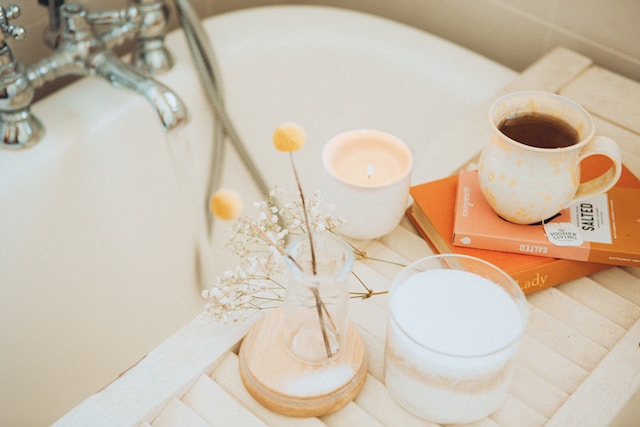For Mental Health Awareness month I’ve detailed different aspects of my mental health journey – an overview, therapy, advocacy, and inpatient care – but this week I want to talk about tools YOU can use to care for yourself, whether you have mental illness or not.
We all have a mental health story, and will experience symptoms of depression, anxiety or even psychosis at some point in our lives. It’s part of the human condition. Situational depression or social anxiety are two of the most common forms of angst, and while they do not necessarily require professional treatment, they still deserve self-care.
What can we do? Here are seven of my favorite self-care tools.
- STOP – literally stop, take a step back, observe the situation, and proceed mindfully. When a situation elicits an emotional reaction, resist the urge to jump in. Take a deep breath. Think about what you want for an outcome, and how you might get there gracefully. Take time to calm down before choosing your path. Your pause could be for a moment, or for a day or more. Try not to react from that emotional position.
- Breathe deeply. Our automatic breaths are often shallow, and from our upper chest. A few conscious breaths deeper into our diaphragm (in the belly) can soothe anxiety. Inhale through your nose for a count of 4, pause briefly, then exhale through your mouth for a count of 7. This pattern not only engages both sides of your brain, but the longer exhale can slow down your thoughts.
- Exercise. This one comes hard to me, but is one of the most effective tools in my toolbox. A walk can increase my endorphins and give me energy when depression is taking over. If I’m anxious or angry, an upper body strengthening workout helps dispel the energy. Dancing wildly around my living room to upbeat music is another way to get my blood pumping and shift how I feel.
- Talk to a trusted friend. They say a problem shared is a problem halved. For me, when I hang onto the stuff that bothers me, my brain makes it even bigger. I feel alone, overwhelmed and often ashamed. Sharing mitigates those feelings, and my friends often help me laugh about my situations.
- Take a bath. I don’t do this often enough, but crawling in a tub of hot water and soaking quietly for a while soothes my spirit. I often light candles too and play soft music. Water is very healing.
- Observe nature. I live in a neighborhood where wildlife abounds, so I can sit in my yard listening to the birds, watching the deer or breathing deeply of the clean air. Maybe your surroundings aren’t as idyllic, but perhaps you can go to your local park or a nearby waterfall. Treat yourself to twenty minutes in a natural setting.
- Download and use a self-care app on your phone. Right now I’m a huge fan of Finch, an app that gamifies self-care. Finch encourages you to practice breathing exercises, journal about your life, set and meet goals, and check in about your mood and motivation levels. These activities are linked to points that you can use to take care of a virtual pet birb (bird). You can send your birb on adventures, decorate their home and change your birb’s appearance.
Of course, these activities will not cure mental illness, but they can mitigate the effects of all sorts of forms of distress.
If your symptoms continue for more than two weeks or are especially intense, you may wish to seek professional intervention. Reach out to your regular medical provider for assistance in locating help. If you have thoughts of suicide or are in some other kind of mental health crisis, call or text 988 for immediate connection with a clinical provider.

💜💜💜💜💜💜💜